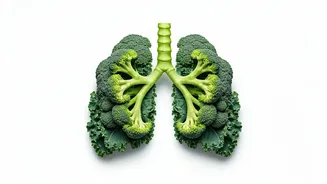Processed Meats: Beware
Processed meats, often found in convenience foods and quick snacks, can pose a risk to lung health. These meats typically contain nitrates and nitrites,
chemical preservatives added to extend shelf life and enhance color. Upon ingestion, these compounds can release nitrogen oxides, which may cause inflammation in the respiratory tract. Regular consumption of processed meats has been associated with a decline in lung function and increased risk of respiratory ailments. Furthermore, the high salt content in these foods can exacerbate existing conditions like asthma.
Sugary Drinks: Proceed Cautiously
Sugary beverages, including sodas, sweetened teas, and fruit juices, contribute to various health issues, including negatively affecting lung health. These drinks are often loaded with refined sugars, leading to inflammation throughout the body. Chronic inflammation is known to affect the lungs, increasing the risk of respiratory infections and other pulmonary problems. High sugar intake can also contribute to weight gain, and excess weight puts additional strain on the respiratory system, making it more challenging to breathe. Consider alternatives like water, unsweetened teas, or infused water to support lung health.
Fried Foods: Exercise Moderation
Foods cooked in high-temperature frying processes can introduce harmful substances that can affect lung health. During the frying process, oils can break down and produce compounds that can irritate the lungs. The excessive fat content in fried foods also contributes to weight gain, indirectly impacting respiratory health. Regular consumption of such foods can lead to an increased risk of respiratory conditions. Opt for healthier cooking methods, such as baking, grilling, or steaming, to safeguard your lung health and reduce the intake of potentially harmful compounds.
Salty Snacks: Minimize Intake
Salty snacks, such as chips, crackers, and pretzels, are often high in sodium, which can have an indirect impact on lung health. High sodium intake can lead to water retention, making breathing more difficult, especially for individuals with existing respiratory conditions. Additionally, excessive salt consumption can contribute to high blood pressure, adding to the strain on the cardiovascular system and potentially affecting lung function. Being mindful of sodium intake and selecting low-sodium alternatives can benefit overall respiratory well-being. Always check the nutrition label for sodium content.
Refined Grains: Choose Wisely
Refined grains, found in white bread, pastries, and many processed foods, may indirectly impact lung health. These grains are low in fiber, leading to fluctuations in blood sugar levels. This can trigger inflammation, which can affect the respiratory system. The lack of essential nutrients in refined grains also means less support for overall health and immune function. Choosing whole grains, such as whole wheat bread, brown rice, and oats, provides more fiber and nutrients, contributing to better overall health and helping maintain lung health.
Dairy Products: Individual Responses
Dairy products may cause issues for some individuals regarding respiratory health. While not universally problematic, some people find that dairy products increase mucus production, which can make it harder to breathe or exacerbate symptoms of existing respiratory conditions, such as asthma or allergies. If you experience these symptoms after consuming dairy, consider reducing your intake or exploring dairy-free alternatives. The response to dairy products is highly individual, so monitoring your body's reaction is crucial to determine if it affects your lung health.
Alcohol: Consume Moderately
Excessive alcohol consumption has potential adverse effects on lung health. Alcohol can impair the immune system, making the respiratory system more vulnerable to infections. Chronic alcohol consumption has also been linked to an increased risk of conditions like pneumonia and other lung diseases. Moderation is key to safeguarding lung health. Limiting alcohol intake and adopting a balanced lifestyle can significantly support respiratory well-being and protect against potential lung damage. Always listen to your body and consult a healthcare professional if you have concerns.












